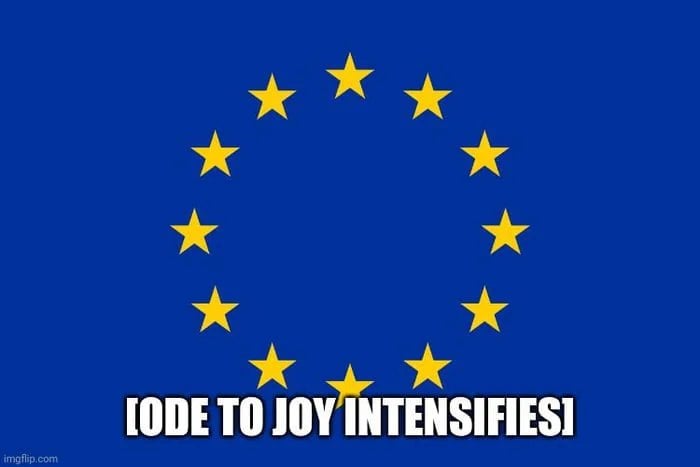“Oh hey, our tracking is so invasive that it is illegal in your part of the world and we are too lazy to do something about it.”
Dodged a bullet there. Thanks EU

I am hearing that tune in my head with teenage me playing the flute in school. I can hear the horrible screeching noises coming out from that plastic tube.
When I was in middle school, some girl sang this song at the talent show. Except she didn’t just sing any version of Ode to Joy. No, she sang this milk commercial version of the song.
The one and only good PSA ever created is the famous Thai government encouragement on the public to stop drinking, go to school, get a job, and use their their knowledge and gained expertise to help others.
I don’t want to link to them because fuck them, though the current top comment contains a link to that site.
The interesting thing is that you get this error message on /us while when you remove it, you get redirected to /global and there is no such message. They went out of their way to collect the data of US citizens while still complying with the GDPR for other users.
Byjus is probably the second sussest company in India, so that checks out. They (sort of) sued banks that had lent them money for asking for it back.
How do you sort of sue someone?
Oh, they sued the banks, but gave some ridiculous excuse for it.
We are too
lazygreedy fucks to do something about it
That website wants to collect and sell all the userdata without consent
Consent? That’s just some woke word made up to damage family-owned businesses!
Them, probably.
To be fair, the founder of the business, Byju, used to be a very ordinary school teacher and then he built this whole thing. Not family-owned, nor born rich.
Fuck their business practices though
Or they can’t or won’t spend the time to comply to regulations of a region they might not do business in anyway.
It’s not a business website, I opened it for some random math article.
If they aren’t doing business in the EU, they don’t need to comply with GDPR. While it technically protects EU citizens’ data everywhere, in practice it’s not possible to govern companies that are completely outside the EU.
Why is it basically only the EU that seems to have an interest in preventing shitty business practices.
Because the US is controlled by corporations
Asia for the most part doesn’t care
Australia is run by right wing nut jobs
New Zealand is quiet so they probably do do something like this but we haven’t heard about it.
Japan is Japan. Civil rights isn’t really a thing.
And China and Russia love invasion of privacy it’s basically the entire basis of their countries.
Well actshually… Australia used to be run by right-wing nutjobs. The current mob in power are centrist nut jobs.
The power behind the throne in Australia is still right wing nut jobs and corporations
I feel like Australia and New Zealand is kind of like England and Scotland in that sense.
Australia is essentially just Texas out in a remote corner of the world. Just a bunch of mining and oil companies running a country.
So your telling me Capitalism is destroying the planet everywhere regardless of the nominal government “in charge”?
I’m really curious (as I’m not living there) what the difference is. Is it just their religious tendencies? Or is it their feelings towards the nebulous “other” that defines them?
In Australia there are two major political parties, Labor and Liberals.
Liberals does not mean what it does in the US, they are the right wing party, who are in a coalition with the Nationals party which is even further right wing.
Labor is now centre-right as they kept running on centre-left policies and losing.
The defining difference between the parties on the domestic front are that Labor supports and Liberals oppose
-
Social safety nets
-
Universal medical care
-
Taxation of corporations
On a foreign policy front they parties are broadly aligned however their stance on how to deal (interact) with China is vastly different, where Labor engages the Liberals attack China endlessly which resulted in a trade war which we’re still feeling the effects of.
This is a very shallow examination of Australia’s political landscape but I’m not a political commentator.
-
I am generally curious what you mean by centrist nut jobs? The whole point of the centre is to be somewhere in the middle and therefore the best of both worlds that everyone has something in common with as far as I’m concerned
There is no “best of both worlds” when one side wants you to be a fucking slave. Wake up, dummy.
How about just a little bit of servitude…?
…wait
“Best of both worlds” doesn’t literally mean expressing everything on a numeric scale and averaging it out.
No, we know.
What’s the best that should we take from the far right?
It’s an ideological desert over there once you look past the race supremacy, inevitable oligarchy and people dying if they don’t spend enough of their time struggling to survive. It’s literally just psychopathic power grabbing when you really distill it down.
If any of that sounds good to you, I’m not interested in the world you want.
Support for centrism is either complete political ignorance, or looking at that desert and thinking “I think we need some of that shit over here”
You forgot Africa, South America, Canada, Greenland(?).
Greenland is a part of Denmark so in the EU
Well yes, but actually no. Greenland is part of Denmark, which is in the EU, but Greenland is not in the EU.
But the Data Protection Authority is the same and they have quite similar laws, most likely completely compliant with EU regulations. Both because cultural connections as well as them wanting to position themselves as a location for internet infrastructure.
Countries like Iceland straight-up implement GDPR because EEA. I’d say both could easily be convinced to become EU members by reforming the fisheries policy into something sane, both when it comes to size of quotas (the EU could pull an order of magnitude more fish out of the water if we’d let stocks recover to the levels from 100 years ago) and distribution of quotas – coasts should be considered (more) like mineral deposits: We’re not getting any Austrian silver either why are they getting our fish, if they want to fish they can buy quotas from a coastal state.
I also had to look this up but Greenland is not in the EU
Africa is still developing so data privacy is the least of their concerns. They’re focusing on creating stable corruption free governments that don’t undergo a coup or civil war every 5 years, and having a hell of a time with that.
Africa is an enormous continent, it contains 53 different countries and what you said is only true of a handful of them.
I don’t blame you, I blame the eurocentric educational system and news media.
that don’t undergo a coup or civil war every 5 years, and having a hell of a time with that.
If by “having a hell of a time with that” you mean “the US loves shutting down developing nations”, absolutely.
There is no evidence the US has been involved in the last several coups, we’ve been supporting efforts at fair democratic processes and development in Africa for years.
Good joke. The US is literally AT ALL TIMES trying to destabilize any country that could potentially pose a problem to their hegemony. As recently as 2022 it has been PROVEN that US agencies tried (unsuccessfully) to undermine Brazilian democracy, as an example. (Before you try to change subjects - yes, Brazil is not in Africa. It’s just a concrete example you can’t dodge with argumentation).
I would like to point the RWNJs finally got voted out in Oz last year (federal and most states). Of course Murdoch and co. are working hard to reverse that, but semi sane leadership is in place for at least a year or two more.
As with most things in the US, California has similar laws to the gdpr (though admittedly not as powerful), so a lot of websites are starting to change a bit in the US because of california.
China and Russia are dictatorships meaning they do whatever the fucknthey like and if you don’t like it you might become suicidal.
Moatly about capitalism i think. If you put on privacy restrictions, you are regulating the market, while capitalism believes that the market should regulate itself, and customers will simply stop using those websites/softwares overtime if its too bad. I find this completely delusional in the era of mega corporations, but thats the capitalistic aproach to this.
capitalism believes that the market should regulate itself
Anarcho-capitalism ⊊ capitalism.
EU is capitalist, so I’m not sure what you’re talking about. Maybe you’re just another person blaming everything on capitalism because that’s easier than understanding the actual problems. Might as well blame it on the prevalent system.
Im not exactly against capitalism, but i do think that a hardcore capitalistic aproach such as the one in the US has many downsides.
Please try not to throw insults or mean assumptions. We are here to discuss.
The EU is a social market economy. It currently slants more capitalist but nothing whatsoever stops member states from taxing the hell out of billionaires shifting it more towards market socialism.
What really doesn’t fly in the EU is the free market <-> unregulated market equivocation that peddlers of institutional market failure enjoy so much. The free market model relies on perfectly rational actors acting on perfect information, in the real world you need regulation to approach that ideal. If you want to see actually unregulated markets have a look at black ones where there’s not even regulations against offers you can’t refuse.
And that’s why the EU is legislating things like caps having to stay attached to plastic bottles: Because not doing it would allow companies to continue to externalise microplastic problems they generate and, innovation costing money, they wouldn’t do it on their own (the new caps aren’t even more expensive per piece it’s just some R&D and very small changes to bottling machines.)
Because they listen to people rather than ignore them and then make policy based on how much money they can make from the deal.
This shows me the EU is actually more democratic then the US is.
It’s much harder to pay off the lawmakers to keep the status quo when the economic area is controlled by dozens of individual governments.
This is actually a particularly important point. The nature of the EU is laden with bureaucracy. Combined with the wide range of cultures, and the rotation of staff, it makes bribing enough people to get your way difficult. You end up needing people in multiple countries to deal with it, and the rotations make long term deals difficult.
The end result is that bribing EU bureaucracy is like trying to stop a river with just hands. It’s far less effective, letting the EU be a lot more effective (if slow).
There’s a reason so many big business interests want to break up the EU.
Shouldn’t it be the same in the US with state and federal governments?
All of the states are owned by one of the same two political parties, and their respective goals are more or less aligned on a state-by-state level, bordering on zealotry.
America is, effectively a monoculture. At least in the UK, there is more variance in accents over 100 miles than over all of the US. The EU has a wide selection of languages and cultures, all with deep histories and quirks. Methods that work in 1 culture will be insulting in another. America is practically setup for mass deployment of propaganda and industrial
bribery, sorry lobbying.The US was originally more like the EU but it federalized pretty hard after the civil war.
Brazil also has a similar law called LGPD, I think it was made based on European GDPR
Actually, and I’m quite proud of this, the LGPD was already being discussed before the EU’s GDPR. It may not look like it, but Brazil is at the forefront of digital protection and privacy.
Because they can’t do whatever they want here
Is
briberypolitical donations not a thing in Europe?Yah, I just get Google to block these sites from ever being recommended again.
I want more predatory websites to do this so that I can avoid them.
Anyone out of the EU can VPN to an EU country and benefit.
Some idiots keep using one of my email adresses for god knows what, ending up in me receiving newsletters and shit. Since actual user accounts are associated, I typically recover the password (since its my email adress) and then delete the account.
There are a few websites with similar restrictions though. They are completely fine sending shit to email adresses they never bothered to verify, but reject logins from countries (or even US states!) that they don’t want. Morons.
that’s when you report as spam. that shit hurts their trust rating and makes their emails more likely to end up in people’s spam folders, pretty much killing their newsletter
Or auto forward it to their customer service email, or company email.
Oh boy, that is a great idea. Every time they email me their shitty newsletter I get to create a new support ticket telling them I don’t want it. Auto forward seems so nice.
You only tell them your email is active with that.
You forward it to them and add that you want to exercise your rights to be forgotten.
Also report to the regulator in your jurisdiction (I believe FTC in the US) because sending unsolicited emails that the user cannot unsubscribe from is illegal in most places.
This is fine imo. If you don’t want to comply, don’t. You just don’t get to extract EU data
Right, at least they are honest about it and - in a way- comply with GDPR by avoiding it.
Yes, but it shows how they behave toward people who aren’t in the EU.
deleted by creator
Poor strawman mate. You don’t have to be “a geoblocking fan,” you can despise it, while also not enabling privacy invasive firms.
A more careful reading would reveal that I’m NOT in favor of enabling the privacy invasion. I’m against blocking regions rather than comply with a common sense law. I really thought using the words “secret malware” about their deceptive practices would have made that obvious…
deleted by creator
I never said you were in favour of it, another assumption you’re making. You asked why the downvotes and the answer is your strawman argument(s), and being against geoblocking and pro privacy isn’t mutually exclusive.
I’m not the one making assumptions here. You’re the one implying that you downvoted my original comment because you thought it was anti-privacy, which it wasn’t.
I know that being against geoblocking and pro privacy at the same time is possible since that’s MY OWN position. I guess that wasn’t clear enough im the original comment, but it should be ABUNDANTLY clear to anyone by now since this is the second or third time I state it explicitly.
cutting people off from important information just because they live in a geographical region that doesn’t allow secret malware.
I think most disagree with your argument, that you need to tolerate ‘secret malware’ to access important information. That information can’t be THAT important or else it could be found elsewhere, completely without malware.
That’s not what I’m arguing. I’m arguing for the sites to comply with the EU law by making the content available WITHOUT the malware rather than by blocking access.
Unfortunately you aren’t automatically entitled to this information that I imagine mostly comes from private for-profit companies.
Yeah, because wanting important information to be freely accessible to the world is SUCH an entitled perspective, unlike pretending that secretly spying on your users and feeding them unwanted ads is justified 🙄
I want free food and housing too, but unless I’m going out and creating it myself, I have to pay the companies that provide them to me.
Im not completely arguing with you, I get annoyed by not being able to read stories from my local paper, but they are paying people to go get that information and turn it into a article. If that was all free, they’d go out of business pretty fast and then there would be no news, just Internet rumors.
You always have the option of a VPN. That and private mode is probably a good best practice for a site like this anyway.
That’s a good point for most of the sites pulling shenanigans like this, but in the case of the news sites I was referring to, none of the negative stuff they do would be allowed under the EU rule
deleted by creator
See, while I don’t like the invasiveness of it, that’s also their business model. If they put it behind a subscription instead, it wouldn’t be right to say “this information is important and needs to be available, stop charging for it,” when charging for it is part of why they provide it. Private companies have a right to not do business with those that won’t pay for their services, even if that payment is your data.
Europeans (and everyone, morally) have a right to privacy that conflicts with the method of payment. This website resolved that, if it can’t get paid in it’s chosen form, it won’t provide its service. That’s fine. I don’t support this decision, but it’s not
If this information is vital to the public, that’s a separate issue entirely, and it needs to be available in some form that isn’t sold. We can’t rely on a private entity not employed by a government to do this of its own free will.
Well, that’s one way to comply
deleted by creator
You can’t just say “nah, fuck it” and not serve the page.
You can, and it’s compliant. It’s a loss of potential business for companies that haven’t made the necessary changes, but they also don’t get your data.Edit: Ehh… it’s bit of a grey area, you’ll probably not see massive companies do this, but smaller ones will, and they’ll get away with it as the EU would much rather being screwing with Zuckerberg and Musk, which is always a good thing. So not 100% compliant, but if the regulation isn’t enforced as the company has made an effort to stop EU types using the site, it’s probably as good as you’ll get short of requiring passports to log in, which is a whole new kettle of angry fish of regulations.
It’s not compliant. You might be serving eu citizens living in other countries. I’ve had to implement gdpr regs for a US only company. This isn’t compliant with GDPR.
Sorry, that’s not correct, the GDPR applies to EU Citizens and Non-EU Citizens located within the EU, and an EU Citizen’s Data if it’s moved outside the EU while the person is still located within the EU. An EU Citizen located outside the EU is not covered, as they would be under the laws and regulations of wherever they’re located.
I literally had to work with lawyers to cover this. GDPR covers EU citizens across the planet. Doesn’t matter where you are. I don’t know where you got your information from, but mine came from both the law, and FinTech lawyers whose job it is is to know this stuff.
My info came from my missus who managed the GDPR compliance for 2 of the top 5 largest pharmaceutical companies on the planet for the of the largest blue chip IT infrastructure provider on the planet. GDPR does not supersede local regulations even if you are a citizen of the EU. A website refusing to do business to IP addresses in the EU does not make it non compliant with GDPR, if an EU citizen physically leaves the EU to a country where GDPR doesn’t apply, it doesn’t magically apply because the keyboard senses an EU finger is on those keys. If someone moves from France to Canada, and uses a local website that doesn’t comply with GDPR, do they automagically get a fine for non compliance? Best they can do is refuse delivery if you try to order something to be shipped back home.
If those pharmaceutical companies try to ever do business in the EU they will immediately find out that the laws do apply. I’m sorry but your “missus” is uninformed. You can go check for yourself instead of believing me though. There’s plenty of resources for it to explain it to both of you.
True, but it’s also a loss of access due to geographical location, which is the opposite of one of the original main tenets of the internet.
One of the main tenets of the internet is you can run your site the way you want, but nobody has to visit it. Kind of like free speech, you can say what you want but nobody has to listen to it.
Not if “the way you want” is by serving malware without giving the user a choice or even informing them that they’re agreeing to malware by entering. That’s all the EU law mandates: seeking informed consent.
There is a difference between cookies (which are just strings of characters often used to keep you logged in) and actual malware executable code.
There’s also a difference between session cookies, which are code to keep track of what you do on the site, and tracking cookies which are code that spies on everything you do online in order to monetize it. A lot of us consider the former benign and the latter malware that we want the option of avoiding.
Is the EU gonna force a company in China to sell something to its citizens or something? Lol.
You can’t just say “nah, fuck it” and not serve the page.
It’s only illegal if you say “nah, fuck it” when users decline to agree with your data collection terms, but offer it when they do.
This is an identical experience, independent of your (dis)agreement with their policies.
The EU only cares if your website affects EU citizens. This one has pulled out of the EU market entirely, the EU doesn’t care then and have no jurisdiction either then.
Source?
Perfect. Would be nice if US implemented the same regulations
Personal data is an enormous market in the US. Too many big players located here. It’d never happen unfortunately. We’d need to replace all of Congress with folks who actually care about rights and people instead of money. We have only a handful on the left and that’s only in the house, and that’s being generous. I haven’t seen any attempts really on the right. So it’d be a long time until this is even remotely possible. I’d be amazed to see a senator actually care about people though. Or even a governor.
Don’t forget the centrists, who want a happy medium between you being a product for someone else’s money, and having privacy. Because, you know, a lack of privacy is totally cool or something…
Sadly, I live in the U.S., so if I went to this website, it would definitely take my data and sell it.
We don’t get a GDPR to protect us. Be glad you do.
Proxy using an EU based server. Not like websites are going to actually check that you live there.
If you use a EU proxy for the site in OPs screenshot you would presumably just get the same message.
No thanks, I like fast internet.
I mean, honestly, you’d have to already have poor Internet to not be able to max out most connections regardless. It’s the lag that is affected and it’s likely still under a second.
I don’t know, I used to use a VPN to France (not the same server each time) when I was downloading torrents, and when I forgot to turn it off, uploads for work were glacial. High upload speed is really necessary for my work because I regularly upload files which are half a gigabyte or more and need to get that done as quickly as possible. Now I VPN to Canada and I don’t really have that problem anymore.
Uploads would likely be a lot more affected as your connection is very lopsided. I should have been more specific that down is a lot more difficult to max out. And uploads are more affected by your connection speed. So yeah, uploads you may see a difference. Depending on what you’re torrenting though, VPN is likely safer for that to begin with.
A torrent client may need settings in the client changed, firewall rules changed, and ports open on the router. Even with all that a VPN could still have a limited connection. Some VPNs allow you control over this but I doubt free ones do
Things are changing rapidly but asynchronous upload/download speeds are not always offered by ISPs and uploading was always slower than downloading… used to be never but I’ve seen more and more ISPs offer asynchronous speeds
There are a huge number of factors that we don’t know that could account for your slower speeds
Fair enough, I’m not an expert. I just know what I experienced when I used the VPN (PrivateInternetAccess FWIW). I didn’t change any settings on it.
Upload speeds will be a lot slower than downloads speeds because VPNs are optimised for downloading. That’s one you mate.
Ok, how was I supposed to know that exactly?
Eh? You are giving VPNs a bad review without knowing how to use them effectively. There is nothing wrong with not knowing something only with assuming.
Why do you need a GDPR to protect you? If you don’t want tracking cookies then don’t let web sites write them to your computer. You are in charge of your computer.
Wish it was that simple. The problem with the internet, as a whole, is someone figured out they can collect just about everything from your data, with or without cookies, and sell it to big companies.
Everything is about that almighty dollar. We are now the product under the guise of being a consumer.
You want to complain about access being blocked because of where you live, fine just makes you an easy commodity to sell to someone else.
Tbf, you want complete anonymity, stay off the web, don’t use bank accounts or credit cards, not even those like cash app, become a hermit and tell everyone to fuck off as you are not for sale.
In reality, it’s policies, like the GDPR, that are actually looking out for your best interest. Here in America the arguement would be “they’re taking away my freedom” or “the government is overreaching” instead of “Hey, someone actually cares about my privacy in the government!”
Like I have said in another group, people complain about their privacy online and then use the likes of chrome for their browser. We say we care about our privacy, but in the end we are a tool that doesn’t do the job we need done.
The thing is, if someone makes observations about you, and save that in the form of data, that’s not your data. It’s their data. It might be about you, but people are allowed to observe and sell their observations.
This is true. However, they need to inform you that they are collecting this data, what data they are collecting, and why, and give you the option to opt out of that data collection.
Just because they can doesn’t give them the right to do so without your explicit permission.
Why? I’m allowed to stand at a street corner and watch people walk by. I’m allowed to count them, and observe the direction they’re going. I don’t need any of their permission to do this. I’m allowed to know who they are, and I’m allowed to tell anyone I want what I saw. I’m allowed to charge money for it, and none of the people I observe are a party to this at all, so why should I need to either not do this, or tell them what I’m doing or ask for their permission to remember what I saw? How is internet tracking different?
Because they use personally identifying I for other than what you saw. In your comment does that mean you have a right to follow their personal life and invade it then sell it to others? No!
Your problem is you like being a commodity rather than just a consumer. You don’t mind your life being intruded on which could include cc numbers or bank account info. You want to lose your money like that that’s fine. Me personally, they can get out of my life and quit following what I want to do just to make a quick buck. Fuck that, me and my personal information is not for sale! And if anyone seems to think it is, I will stop them as that is my right.
Personally I think all tracking cookies should be banned on the internet worldwide! I am not a commodity.
I think there’s a difference here where there’s a reasonable expectation of privacy, and where there is not. Out on the sidewalk, you don’t have one. Selling someone’s CC is a violation of contract law because you do have an expectation of privacy there. So, we have to be very clear, what kind of data are we talking about? “Sharon Thomas visited this site, looked at these items, spent 14.2 seconds looking at that item, then clicked on this link,” I think, is not something you can expect privacy from.
However, there are some things I do think you have an expectation of privacy from, which is the collation and sale of personal information that the customer enters into the site for the purposes of business with that site, like the collation names with addresses, driver’s license numbers, social security numbers (or whatever local equivalents), etc. Another thing is that, and I don’t know if I’m 100% right here, but I believe that when you visit a site, even by typing an address into the address bar, the site you’re visiting is told, by your browser, what site you’re coming from. That doesn’t make sense to me, and that’s not a thing that should exist.Nonetheless, I don’t think the GDPR is a good fit for addressing any of these issues.
Cookies aren’t nearly the only form of tracking.
EU for the win.
Well, this is what you wanted isn’t it? Your government is protecting you, anyone who can’t comply can’t serve you.
I read that as you being facetious, but: Yes this is exactly what I want. If a service can not comply with GDPR, the service should not be accessible. It would be great for their customers if the service decided to change their practices to become compliant, but that is a business decision they need to make.
Adding to that: Compliance is not even that hard to implement. I build almost all of my websites with GDPR compliance in mind and it’s not really a big deal. There are easy to use tools like Cookie Consent and some of the sites don’t even need a banner at all if they have no tracking (which you know, is completely possible too).
Cookie consent is the tip of the iceberg for GDPR compliance. If you’re not collecting any user data for any reason, such as account creation, then you’re probably ok with cookie consent, but GDPR is non trivial to comply with for companies collecting personal data.
Well I’m only being facetious insomuch as the OP is annoyed at a perfectly predictable outcome of laws that Europeans wanted. I’m very critical of the GDPR, I do want laws that prevent data harvesting but I just don’t think the GDPR was the right approach.
Not “can’t comply” but “doesn’t want to comply”. Other than that fully agreed, it is what I wanted.
Oh no! What will I do now without the prescient geopolitical insight of the Chattanooga Evening Telegraph?
The OP is irritated for some reason, I guess they really wanted that insight.
No, I just don’t want sites like this to appear in my search results.
anyone who can’t comply can’t serve you.
That’s not true. If the company isn’t doing business in the EU, they don’t need to comply with the GDPR. What I mean is, they’re entirely outside the jurisdiction of the EU and are not required to comply with any EU law. If the EU decides they want to force a non-EU company to comply, they have no ability to do so.
Serving ads to Europeans is doing business in the EU, and the US and EU have reciprocal civil enforcement mechanisms.
It’s for the greater good, but it’s also somewhat against the intention of the law, IMO.
Dataprotection is meant to give users control of their data. A restriction like that takes away a bit of my control, however, since it prevents me from doing whatever the fuck I want with my data.
But again: greater good. It also protects people who don’t know what they are doing.
wtf is a byju… looks it up… ok, interesting.
So? What is it?
It’s a highly controversial tech company into online education in India. Controversial because they were a highly valued but hugely loss making company and then they apparently fudged their financials, Deloitte quit as their auditor, they underpaid and laid off 1000s of employees/educators, and cheated customers/parents into buying expensive bundles through super aggressive marketing where not so savvy customers were “bullied” into making purchases that are hard to unsubscribe
For example -
Yikes. Thank you for the update.
Looks like its a educational learning app.
I literally linked to it!
Doesn’t help much if you live in the EU because the reason this post exists.
I think they want to know if it is safe to click at work. Which seems like it is but the wiki link is more helpful.
I wish more invasive websites would do this.
Trust me, you don’t want to visit that website (company).Its sales and marketing methods are scam at best.
Shows how broken the internet was and still is, basically the homeland of the internet is incapable of building pages that comply with basic regulation.
Incapable is not the same as refuses to.
I got to agree. Maybe they just don’t understand or agree to what compliance involves. Company could be busy making widgets and not want to risk lawsuits from a region they don’t directly do business with anyway.
Nah. It’s because they want to sell data. It’s super easy to comply unless you collect data from visitors. And you literally just have to say “if you click no, then we won’t collect data”. Some sites go out of their way to actually force you to opt out of every single cookie.
























